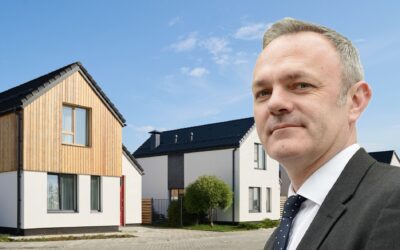Ahead of his welcome address at this year’s Housebuilding Summit Michael Kelleher, IHBA President and Group Operations Director of O’ Flynn Group, shares his industry views on what will be a pivotal year for the industry
In the past year, Ireland witnessed the completion of just under 33,000 homes, a commendable achievement, aligning with targets set in Housing for All.
This marked a significant 10 per cent increase from 2022 and an impressive 60 per cent surge from 2021.
However, as we assess the landscape, it’s clear that meeting actual demand requires a more ambitious approach, with an annual delivery target of 45,000 to 50,000 homes.
To achieve this scale of delivery, several critical components must align. A functioning planning system, sufficient zoned land, and essential infrastructure are critical. Encouragingly, the industry is spearheading efforts towards digitalisation and modern construction methods, promising greater efficiency and reduced delivery times for housing completions.
As we look ahead to 2024, a pivotal year for the industry, it’s vital to make strategic decisions that will shape its capacity to meet the needs of a growing population.
The forthcoming planning and development bill, set to be introduced by the Government, holds immense importance. This legislation is pivotal in establishing a planning system that provides clarity and certainty, essential prerequisites for sustainable development.
Equally crucial is ensuring adequate resourcing for Local Authorities and An Bord Pleanála to expedite decision-making processes, fostering confidence among funders necessary for supporting development delivery.
Moreover, the ongoing review of the National Planning Framework assumes critical significance.
Past shortcomings have underscored the importance of accurately anticipating population growth and addressing resulting infrastructural deficits.
The previous iteration of the NPF underestimated population growth, leading to the unfortunate de-zoning of lands during the last review cycle of the Development Plan.
This oversight has not only hindered housing development but has also exacerbated infrastructural deficits, stemming from conservative population estimates.
To address these challenges effectively, immediate action is required. In tandem with planning reforms, economic realities must also be considered.
The extension of the contribution waiver scheme and the Uisce Éireann Refund Scheme is central to facilitating the delivery of economically viable homes nationwide.
In recent years, substantial material cost inflation, coupled with stabilising yet burdensome interest rates, has significantly impacted the affordability of homeownership.
Consequently, affordability remains a pressing concern for both the industry and new home purchasers alike. In this context, initiatives such as Help to Buy and the First Homes Scheme play a vital role in assisting prospective buyers in accessing the property ladder.
A noteworthy development in recent months has been the ability of single individuals to purchase new homes independently, a welcome trend indicative of the schemes’ efficacy.
Furthermore, the enactment of Compact Growth Guidelines earlier this year is pivotal in ensuring the delivery of affordable, own-door homes.
However, it’s necessary for Local Authorities to prioritise viability alongside density, as the proposition of high-density schemes in key urban areas must be economically feasible to yield the desired outcomes.
While government subvention schemes like Project Tosaigh and Croí Cónaithe have unlocked certain developments, it’s evident that delivering brownfield sites at scale requires a substantial increase in annual investment.
Without adequate funding, the viability of such projects remains uncertain, hindering efforts to address housing shortages effectively.
Amidst these discussions, it’s crucial to maintain a balanced tenure mix, with houses for sale remaining a cornerstone of housing policy.
The inability of the younger generation to purchase their own homes represents a significant frustration, underscoring the importance of ensuring accessibility to homeownership for all segments of society.
We in the IHBA believe there is an urgent need for transitional arrangements to zone more land which is capable of being serviced in the short term to meet the pent-up demand that exists.
The IHBA are in agreement with a plan led development, however this is only going to work if there is adequate and timely investment in infrastructure to ensure we can bring forward lands through the planning process in a timely manner so we can commence construction onsite.
Currently it is taking anything from two to four years and more to obtain a successful planning permission, this timeline is far too long. There is also a need to relook at the County Development Plan Reviews process.
It’s important that once Development Plans are democratically adopted, with input from local authorities, planning teams, representatives, community groups, and stakeholders, they are seen as blueprints for development of the area.
In that regard, if a planning application comes forward and meets all the criteria of the development plan including densities, open space and so on, people should not have the ability to object when such a plan has been democratically adopted and is in line with the National Planning Framework.
We must have certainty in our planning process. At its core, the objective is to deliver more homes to accommodate the needs of a growing population.
This imperative not only supports economic expansion but also ensures the prosperity of future generations.
Foreign investment plays a significant role in this endeavour, underscoring the importance of providing diverse housing tenures to attract investors.
By maintaining a balanced approach, where homeownership and rental options are accessible to all, Ireland can sustain its economic growth trajectory while meeting the housing needs of a growing workforce and population.
The IHBA Housebuilding Summit 2024 takes place April 16 in Croke Park, Dublin

![MichaelKelleher-1912-CROP[178213]](https://constructionmagazine.ie/wp-content/uploads/2024/04/MichaelKelleher-1912-CROP178213.jpg)






